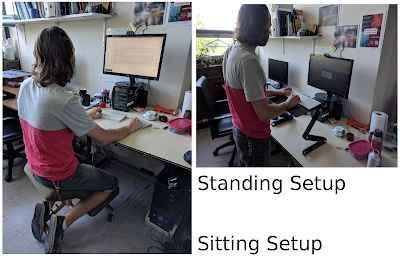I am Martin Miguel, and This is How I Work
 Today, I have the pleasure of inviting Martin Miguel to the “How I Work” series. In his own words: I’m Martin. Better known as March. I did my Bachelor and Masters in Computer Science at Universidad of Buenos Aires in Argentina. My hobbies include writing, biking, rock climbing, dancing (particularly tap-dance) and playing music. As a consequence of my interests, I was curious on what made rhythms so entrancing and exciting. I am now half way into my PhD program, trying to use computer science and math to model human expectations while listening to rhythms. Models of expectation could help design better stimuli and perform more precise analysis on how the defiance of expectations that happen in certain rhythms relate to how it makes us feel. I have also held several positions as a software engineer and been a TA for several years at the university.
Today, I have the pleasure of inviting Martin Miguel to the “How I Work” series. In his own words: I’m Martin. Better known as March. I did my Bachelor and Masters in Computer Science at Universidad of Buenos Aires in Argentina. My hobbies include writing, biking, rock climbing, dancing (particularly tap-dance) and playing music. As a consequence of my interests, I was curious on what made rhythms so entrancing and exciting. I am now half way into my PhD program, trying to use computer science and math to model human expectations while listening to rhythms. Models of expectation could help design better stimuli and perform more precise analysis on how the defiance of expectations that happen in certain rhythms relate to how it makes us feel. I have also held several positions as a software engineer and been a TA for several years at the university.
General:
Current Job: PhD Candidate and Assistant Teacher
Current Location: Buenos Aires, Argentina
Current mobile device: Nexus 6P (Android)
Current computer: Desktop + Asus Zenbook 2013 (Ubuntu) + Asus Chromebook 2015 (Chrome OS)
Can you briefly explain your current situation and research to us?
I am currently finishing the fourth year of my PhD (of five). I have a Bs and Ms in Computer Science and my research centers in developing computational models of music expectation to analyze affect in music, more specifically, rhythms.
What tools, apps and software are essential to your workflow?
Most of my workflow organization centers around Trello. I have 4 columns: ToDo, Next Sprint, Current Sprint, Today, Done – Sprint. ToDo is a backlog of all tasks to be solved. Next Sprint are things I need to get done on the next sprint. Current Sprint and Today organize the tasks planned for the current sprint, where the tasks in Today are more pressing. Done – Sprint is where I archive done tasks for the sprint. I have a script that I run every monday that produces an email with the tasks in Done – Sprint and those in Current Sprint and Today. Each Monday I set up what I’ll do this week (my sprints last a week) and run the script. The mail archives what I have done and what I will do. I share this email with my advisor.
Then, most of my work is either writing in Latex or coding in python. I work mostly on my Ubuntu terminal. I use vim for all my writing needs with several plugins. The tools I most commonly use in my work in the terminal are:
* https://github.com/rupa/z for quickly traversing my folders in the terminal. It uses a most recently used criterion for lookup that allows typing just a small part of the path to arrive at the desired folder.
* I write most of my small documents and quick slide drafts in markdown and then convert them to latex, beamer or html slides using pandoc.
* I use Jupyter notebook for exploring datasets and trying ideas that need visualization or learning a code framework.
* Byobu for multiplexing my terminal as to keep several tabs open.
* Vimium plugin for chrome to selecting links without using the mouse.
What does your workspace setup look like?
After using two monitor for some time I got used to only one. With the boom of tablets, I got used to using everything fullscreen. I use the multiple workspaces in Ubuntu, set up shortcuts for changing between them quickly (ctrl+{1-4}) and then assigned a specific use to each one of them (terminal, chrome, pdfs, spotify). Then I know where everything is and its faster than doing alt+tab. This saves me a lot of mouse time.
In the physical plane, I raised my monitor to be just below eye line. I use an ergonomic chair that helps me keep my back straight (see picture). Every now and then I also work standing. Because its not easy nor cheap to find a standing desk, I got a thingy to place your notebook to work standing up that I use to place my mouse and keyboard (both wireless) (see picture). Sometimes I raise the monitor to match, but not always.
I also have a desktop set up at home but I use it much less than the one in my office.
What is your best advice for productive academic work?
Divide your work in short task so you don’t get overwhelmed by the size of your plans. Value more putting in consistent hours instead of burning fast to achieve a lot quickly. If you get burn from overworking is harder to recover.
How do you keep an overview of projects and tasks?
I manage my work by doing one-week sprints. Each Monday, I set a list of tasks to accomplish that week. Then, each day I set aside what’s more important for that day. By the end of the week (at the start of the next Monday) I see what I managed to do and plan the new week. I try to keep my tasks short, ideally something that fits into a day. If something is longer than two days, I try to split it into shorter tasks.
To actually organize this I use a Kanban board in Trello. I also have a script that I run on Mondays that read what I have done last week and what I plan to do on the current week and composes an email with that information.
My kanban board has the following columns (left to right):
* Papers (list of papers I’m interested in reading)
* ToDo (list of things I want to get done eventually)
* Next Sprints (priority tasks for next week)
* Sprint (list of things to be done during the current sprint)
* Today (priority task for today)
* Done – Sprint (list of tasks accomplished during the current sprint)
* Done (list of all done tasks)
Besides phone and computer, do you use other technological tools in work and daily life?
Mainly my chromebook, for working outside the desktop and my kindle, for reading books, news and papers.
Which skill makes you stand out as an academic?
I wouldn’t be able to tell if it’s really working or if its something special, but what I appreciate the most if that I am mostly focused on trying to answer my research question, rather than doing flashy things, and that I am willing to learn outside my comfort zone in order to get closer to answers.
What do you listen to when you work?
I rarely listen to music when I work since I find it hard to stay focused. When I need music, it is often classic jazz, some focus electronic music and sometimes more pop-like electronic music if I’m coding.
What are you currently reading? How do you find time for reading?
Currently: The Value of Everything, by Mariana Muzzacato. I usually travel by bike but every so often I choose public transportation to read. Sometimes I carry my bike on the train and I read there. I mostly carry my kindle anywhere I know I might have to spend some time doing nothing to read.
Are you more of an introvert or extrovert? How does this influence your working habits?
I’d say both. I love socializing and getting to know people, but I can be very shy when it comes to speaking my mind or asking for help. As a consequence, I meet with my advisor probably less often than recommended. Fortunately, I have managed a decent habit of reaching out when its actually needed. If not with my advisor with other people at the lab.
What’s your sleep routine like?
Messy. I usually get 7hrs but I find it hard to go to bed and wake up at a constant time.
What’s your work routine like?
Other than my routine on Mondays to plan my week, I try to scratch things off my list. Period. Could probably use some better organization. I also teach in school which at times can take a lot of time away.
I try not to work during weekends, as to be rested for the week. Every now and then, if I am having trouble to focus, I use the pomodoro system, on 45-15min splits.
What’s the best advice you ever received?
Avoid saying “I’m going to prove that …” and think in terms “I want to learn if …”. I believe that helps produce better and less biased scientific questions.

